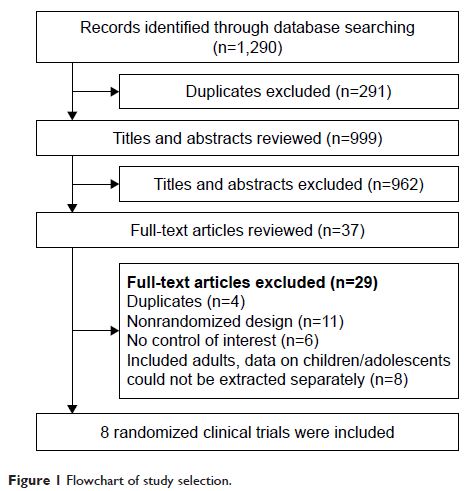108985
论文已发表
注册即可获取德孚的最新动态
IF 收录期刊
- 3.4 Breast Cancer (Dove Med Press)
- 3.2 Clin Epidemiol
- 2.6 Cancer Manag Res
- 2.9 Infect Drug Resist
- 3.7 Clin Interv Aging
- 5.1 Drug Des Dev Ther
- 3.1 Int J Chronic Obstr
- 6.6 Int J Nanomed
- 2.6 Int J Women's Health
- 2.9 Neuropsych Dis Treat
- 2.8 OncoTargets Ther
- 2.0 Patient Prefer Adher
- 2.2 Ther Clin Risk Manag
- 2.5 J Pain Res
- 3.0 Diabet Metab Synd Ob
- 3.2 Psychol Res Behav Ma
- 3.4 Nat Sci Sleep
- 1.8 Pharmgenomics Pers Med
- 2.0 Risk Manag Healthc Policy
- 4.1 J Inflamm Res
- 2.0 Int J Gen Med
- 3.4 J Hepatocell Carcinoma
- 3.0 J Asthma Allergy
- 2.2 Clin Cosmet Investig Dermatol
- 2.4 J Multidiscip Healthc

儿童青少年抑郁和焦虑症书目疗法的疗效和可接受性:随机临床试验的荟萃分析
Authors Yuan S, Zhou X, Zhang Y, Zhang H, Pu J, Yang L, Liu L, Jiang X, Xie P
Received 28 September 2017
Accepted for publication 9 November 2017
Published 24 January 2018 Volume 2018:14 Pages 353—365
DOI https://doi.org/10.2147/NDT.S152747
Checked for plagiarism Yes
Review by Single-blind
Peer reviewers approved by Prof. Dr. Roumen Kirov
Peer reviewer comments 2
Editor who approved publication: Professor Wai Kwong Tang
Background: Depression and anxiety are the most common mental disorders in
children and adolescents. Bibliotherapy is a treatment using written materials
for mental health problems. Its main advantages are ease of use, low cost, low
staffing demands, and greater privacy. Yet few meta-analyses have focused on
the effect of bibliotherapy on depression and anxiety disorders in children and
adolescents.
Methods: We included randomized controlled trials comparing bibliotherapy
with control conditions for depression and anxiety in children and adolescents
(aged ≤18 years). Five electronic databases (PubMed, Embase, Cochrane, Web of
Science, and PsycINFO) were searched from inception to January 2017. Efficacy
was defined as mean change scores in depression and anxiety symptoms.
Acceptability was defined as the proportion of participants who discontinued
the treatment. Random effects model was used. An intention-to-treat analysis
was conducted.
Results: Eight studies with 979 participants were selected. At
posttreatment, bibliotherapy was significantly more effective than the control
conditions in reducing the symptoms of depression or anxiety (standardized mean
difference, -0.52; 95% confidence interval [CI], -0.89 to -0.15). Bibliotherapy
did not have statistically significantly more all-cause discontinuations than
controls (risk ratios, 1.66; 95% CI, 0.93 to 2.95). We also performed subgroup
analyses for efficacy outcomes in different categories (types of disorder, mean
age, control conditions, and parental involvement) of studies and found that bibliotherapy
has been more effective in depressive adolescents.
Limitations: Limited studies were eligible in this review and hence there was
potential publication bias.
Conclusion: According to the findings in this review, bibliotherapy may be
more beneficial in treating depression in adolescents, but shows less robust
effects for anxiety in children. Further well-defined clinical studies should
be performed to confirm these outcomes.
Keywords: mental disorders, bibliotherapy, young, meta-analysis, self help,
psychotherapy
